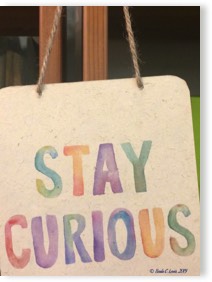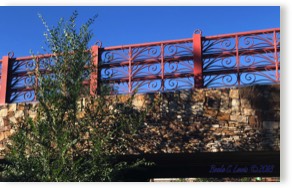Bridging Lives Notes: February 2019
Trust in Leadership
Becoming More Masterful with TRUST
Trust is like a superpower.
What’s your life like when you’re experiencing more trust? At least in theory, you surely know that trust is essential for masterful leadership and it’s like the connective tissue of our lives. We tend to talk about the presence of trust in rather vague, aspirational terms but get very specific and visceral when trust is broken, shattered, or absent. It might be more accurate to say that sustaining or restoring authentic trust through a "storm" is the real superpower.
I’ve been a student of trust for a long time. Maybe that’s mostly because trust is perfectly fabulous when it’s easy, but challenges me to the core of my being when it’s hard. Professionally, first as an attorney and mediator and now as an executive coach, I came to see trust as the atmosphere in which everything we care about thrives. A wise teacher of mine, Angeles Arrien, used to say that you can think of trust as one side of your hand or of a sword; the other side is control. They’re both part of the same thing. Now, how will you use that hand or that sword?
How many nuanced ways of exercising control - especially as a coping strategy where trust is flimsy - have become like the fabric of your being over a lifetime? If your eyes roll or your stomach churns when someone says, “trust me!,” you’re in good company. Same if you have even a subtly recoiling response when someone – even a well-intentioned coach – suggests that you could show up as more trustworthy or rebuild trust where it seems ill-advised or maybe even impossible.
When things get tough, who do we become with more trust?
What’s your life like when you’re experiencing more trust? At least in theory, you surely know that trust is essential for masterful leadership and it’s like the connective tissue of our lives. We tend to talk about the presence of trust in rather vague, aspirational terms but get very specific and visceral when trust is broken, shattered, or absent. It might be more accurate to say that sustaining or restoring authentic trust through a "storm" is the real superpower.
I’ve been a student of trust for a long time. Maybe that’s mostly because trust is perfectly fabulous when it’s easy, but challenges me to the core of my being when it’s hard. Professionally, first as an attorney and mediator and now as an executive coach, I came to see trust as the atmosphere in which everything we care about thrives. A wise teacher of mine, Angeles Arrien, used to say that you can think of trust as one side of your hand or of a sword; the other side is control. They’re both part of the same thing. Now, how will you use that hand or that sword?
How many nuanced ways of exercising control - especially as a coping strategy where trust is flimsy - have become like the fabric of your being over a lifetime? If your eyes roll or your stomach churns when someone says, “trust me!,” you’re in good company. Same if you have even a subtly recoiling response when someone – even a well-intentioned coach – suggests that you could show up as more trustworthy or rebuild trust where it seems ill-advised or maybe even impossible.
When things get tough, who do we become with more trust?
Working with both emerging and highly positioned leaders and business owners, really tricky issues tend to have trust at their core. Some generic but consistently difficult examples include:
What else would you add to this list so it's potent for you? Any variation you can think of is valid. I have also found that people often miss the trust factor that's embedded in issues or relationships with which they struggle.
You probably know some version of this expression: “trust in Allah but tie up your camel.” It’s as though trust is necessary but insufficient. Have you heard anything like this statement that I once heard a leader say with great authority: “if you’re relying on trust, your business will fail.” Is this true? How do you know?
Trust is the "soft" foundation for everything "hard" we care about and measure in leadership and business. How are trust and connection critical and indispensable to achieving the outcomes that matter to you?
What could upgrading trust mean for you?
Upgrading trust could be all about collaborative capacity building. It typically means up-regulating our capacity to communicate, coordinate, work constructively with conflict, and co-create something better. Restoring trust is about boundaries, agreements, and a capacity to choose anew. If you want high-trust, high-performing engagement where you work, then becoming more masterful and nuanced about building, sustaining, and restoring trust is worth your precious attention and practice.
- “I don't trust my boss” – When you distrust the person who has authority over your work and who could be a gatekeeper for your advancement, what does “managing up” look and feel like?
- “I don’t trust my team” – When you feel guarded or anxious about how people will perform or how you can take risks together, what does being a “team player” look and feel like?
- “I don’t trust this situation” – When you withhold what’s true for you in a situation or feel reticent (lacking confidence) about stepping forward, what do “self trust” and leadership authenticity and agility look and feel like?
What else would you add to this list so it's potent for you? Any variation you can think of is valid. I have also found that people often miss the trust factor that's embedded in issues or relationships with which they struggle.
You probably know some version of this expression: “trust in Allah but tie up your camel.” It’s as though trust is necessary but insufficient. Have you heard anything like this statement that I once heard a leader say with great authority: “if you’re relying on trust, your business will fail.” Is this true? How do you know?
Trust is the "soft" foundation for everything "hard" we care about and measure in leadership and business. How are trust and connection critical and indispensable to achieving the outcomes that matter to you?
What could upgrading trust mean for you?
Upgrading trust could be all about collaborative capacity building. It typically means up-regulating our capacity to communicate, coordinate, work constructively with conflict, and co-create something better. Restoring trust is about boundaries, agreements, and a capacity to choose anew. If you want high-trust, high-performing engagement where you work, then becoming more masterful and nuanced about building, sustaining, and restoring trust is worth your precious attention and practice.
Our capacity to trust has a lot in common with our capacity for love, compassion, cooperation, empathy, etc. We’re born with it. Our very survival and capacity to thrive depend on it. But that’s not all. We’re wired to “scan” perpetually for and protect against threat, especially social threat. What we know to be “true” is also distorted by umpteen perceptual biases that could be at play in any situation. As with love, we learn and eventually are challenged to unlearn some powerfully distorted and dysfunctional lessons about trust. As an undifferentiated blob, trust either is or isn’t…trustworthy. What gives “trust” a fighting chance and why become more masterful with it anyway?
A marvelous thing about how we’re “wired” for trust is that we can experience distrust and trust at the same time. Recent neuroscience discoveries have shown that distrust and trust activate different parts of the human brain. The phenomenon can be called simultaneity. Distrust activates a primal threat response; perhaps you've heard of the "amygdala hyjack." Trust activates our executive and creative thinking capacity. Brain imaging shows that both can be activated simultaneously. A key question then is which signals and neural pathways are stronger and take charge. When we orient towards bringing trust (back) online, we exercise our smarter capacity for more openness, adaptive choice, and resilience.
A marvelous thing about how we’re “wired” for trust is that we can experience distrust and trust at the same time. Recent neuroscience discoveries have shown that distrust and trust activate different parts of the human brain. The phenomenon can be called simultaneity. Distrust activates a primal threat response; perhaps you've heard of the "amygdala hyjack." Trust activates our executive and creative thinking capacity. Brain imaging shows that both can be activated simultaneously. A key question then is which signals and neural pathways are stronger and take charge. When we orient towards bringing trust (back) online, we exercise our smarter capacity for more openness, adaptive choice, and resilience.
What definition of trust do you rely on and how does it work for you? There are many. One definition I recently heard is this equation: Trust = Credibility + Empathy. Another definition for trust is our "predisposition to coordinate action with others.”
In Conversational Intelligence® (C-IQ), the acronym for TRUST shines light on one way to orient for more of it, especially in conversation:
In Conversational Intelligence® (C-IQ), the acronym for TRUST shines light on one way to orient for more of it, especially in conversation:
- Transparency. What is my / your need for transparency? What can we be more transparent about that would orient us toward trust?
- Relationship. What quality of relationship is needed for what we’re up to? What could improve our connection and orient us toward trust?
- Understanding. What do we need to understand about ourselves, each other, and the situation so we can more fully appreciate what’s at play here? What would allow us to feel into the deeper reality we’re each coming from?
- Shared Success. What could shared success look and feel like? How might we each contribute towards the success of the “we” reality while still attending to the success of the “me” reality?
- Truth with Empathy. What truth can I / you reveal and receive now? How do we communicate our truth with empathy – empathy for ourselves and for each other? What can make our truth trustworthy?
Without exception, every time I’ve found my way to the other side of a trust breakdown for myself or with clients, the path forward oriented me, or them, towards trust. In the midst of a storm, that’s where we find the next steps forward. Does that mean giving up all vigilance or control? No. It means connecting to what, indeed, can be trusted and expanding on that.
I think of undifferentiated trust – or “blind” trust – as captive to the threat response. It’s either on or off like a binary toggle and fear controls the light switch. For trust that is more a victory of the human spirit, add some differentiation about the types of trust needed and how those can be (re)built or broken. Then we have workable options for mitigating risk and improving the result or reward. We have guidance for navigating new conversations that increase the sense of sincerity, competence and reliability that are necessary for “authentic” trust. Best of all, orienting towards trust grows our capacity to respond as our better self. With perseverance, respect, and love of what matters most to you, it can even literally change your reality for the better.
I think of undifferentiated trust – or “blind” trust – as captive to the threat response. It’s either on or off like a binary toggle and fear controls the light switch. For trust that is more a victory of the human spirit, add some differentiation about the types of trust needed and how those can be (re)built or broken. Then we have workable options for mitigating risk and improving the result or reward. We have guidance for navigating new conversations that increase the sense of sincerity, competence and reliability that are necessary for “authentic” trust. Best of all, orienting towards trust grows our capacity to respond as our better self. With perseverance, respect, and love of what matters most to you, it can even literally change your reality for the better.
Engage for More…
As the guest speaker for the February ICF-NM members' program I recently offered
Upgrading Trust to Energize Collaboration.
Overwhelmingly, participants commented that they had no idea that an exploration around trust issues could be so rich, varied, and grounded in well-researched and pragmatic distinctions. In the brief time we had, they gained insights for new ways to think about and take action on a trust challenge in their own lives or with clients. Most of all, it was fun and enlivening to explore what can make a real difference in a situation that really matters.
Are you looking for a SPEAKER or WORKSHOP to engage leaders where you are? Let's explore what can make a difference for you. Contact me!
Upgrading Trust to Energize Collaboration.
Overwhelmingly, participants commented that they had no idea that an exploration around trust issues could be so rich, varied, and grounded in well-researched and pragmatic distinctions. In the brief time we had, they gained insights for new ways to think about and take action on a trust challenge in their own lives or with clients. Most of all, it was fun and enlivening to explore what can make a real difference in a situation that really matters.
Are you looking for a SPEAKER or WORKSHOP to engage leaders where you are? Let's explore what can make a difference for you. Contact me!
You are the Bridge to "Better"
I'll be delighted to hear from you in response to the notes offered here.
We can work together from anywhere – whether as an individual or in a group. You are, of course, welcome to meet me in Santa Fe, NM, but the distance between us is easily bridged from wherever you are. Reach out and let’s explore what’s possible together.
For the work that's yours to do, you are the bridge to "better." Thank you for the important work you do and the leader you're becoming while you do it. I'm here as your ally, partnering with you to thrive.
Be in touch...and stay tuned!
Warmly,
Beata
- Let me know what resonates for you in these notes.
- Ask about ways we can focus on growth for you.
We can work together from anywhere – whether as an individual or in a group. You are, of course, welcome to meet me in Santa Fe, NM, but the distance between us is easily bridged from wherever you are. Reach out and let’s explore what’s possible together.
For the work that's yours to do, you are the bridge to "better." Thank you for the important work you do and the leader you're becoming while you do it. I'm here as your ally, partnering with you to thrive.
Be in touch...and stay tuned!
Warmly,
Beata
Lead. Collaborate. Grow. ...to Thrive!











